Disclaimer: Please evaluate your health and legal risks before using psychedelics.

Microdosing has been quite a hype in media these days. While being curious about its said mood-enhancing and productivity-boosting effects, I couldn't help but recall a Chinese proverb my grandma likes to say: "With every medicine comes 3 toxins!" Indeed, I have at least three concerns about the potential "toxicity":
1) What are the side effects, if any?
2) Are there any nasty withdrawal symptoms? and
3) Even if researches have shown that microdosing is not physiologically addictive, what about mental dependence?
I mean, if microdosing really brings out a better version of me, will I become attached to that? Will I no longer be able to live with the uglier sides of life, and having to keep on dosing? Plus, I was quite skeptical of the mentality of optimization in this fast-paced, competitive world: what are we optimizing ourselves for? For the careers we have long lost passion about? For bosses or relationships that we otherwise can’t tolerate?
Cynicism aside, my curiosity for "a really good day", in Ayelet Waldman's words, overtrumphed. I decided to try microdosing psilocybin truffles for 30 days, and to keep track of its major benefits and side effects in a spreadsheet and in vlogs. I only had one day as my baseline (ideally it should be at least a month), yet I did continue tracking in the months after I withdrew so as to observe the lasting effects, if any.
A bit more about my health: I don’t have any contraindications with psychedelics. A few years ago, I had been struggling with some childhood traumas, and found my healing and transformation through the intentional use of psychedelics. Since I considered myself mentally healthy enough by the time I tried microdosing, my intention was not therapeutic but, in Bob Jesse’s words, “for the betterment of the well”.
As for the dosage, I first followed the Dr. James Fadiman's suggestion, taking a 1/10 of a regular dose every third day. However, as my body is quite small (50kg, 158 cm) and very sensitive, my sweet spot was lower than average (less than 0.1g dried truffles, or 0.3g fresh ones), and the 2-day gap was sometimes too short for me. It's very important to listen to your body and customize the dosage and frequency accordingly.
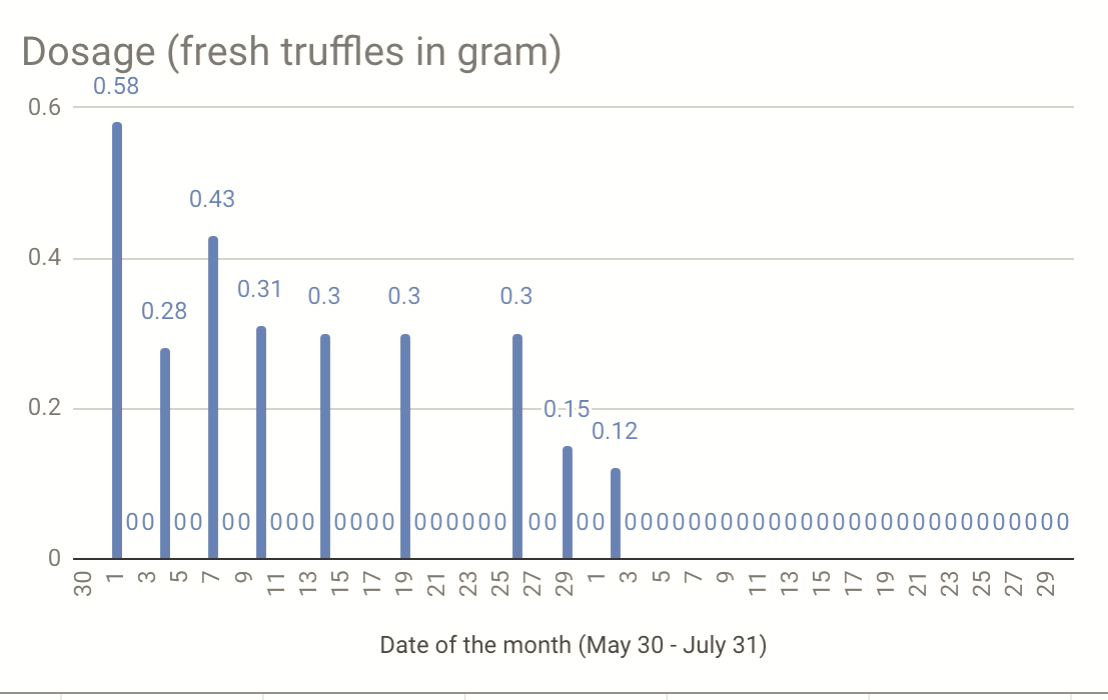
So, was it mentally addictive? The short answer is, as I happily found out, not for me. Why? Let me explain all the benefits, side effects, withdrawal symptoms and the lasting changes that have together made this microdosing journey wonderful yet also easy to let go.
1. Benefits
1.1. Moods
For the convenience of data analysis, I categorized various moods as "positive" (such as joy, love, courage, passion, peace) and "negative"(like anger, fear, grief, anxiety, shame), and score them on a scale from 0 to 10 (0 meaning irrelevant, 10 the most intense). Towards the end of the 30 days, however, I didn't want to label them that way any more. I felt more comfortable to just sit with, say, sadness or shame if that was alive in that moment.
Well, With the meditation, non-violent communication and circling (interpersonal mediation) that I had been practicing before microdosing, this was not a new insight, but still, those 30 days helped me embody it even deeper.
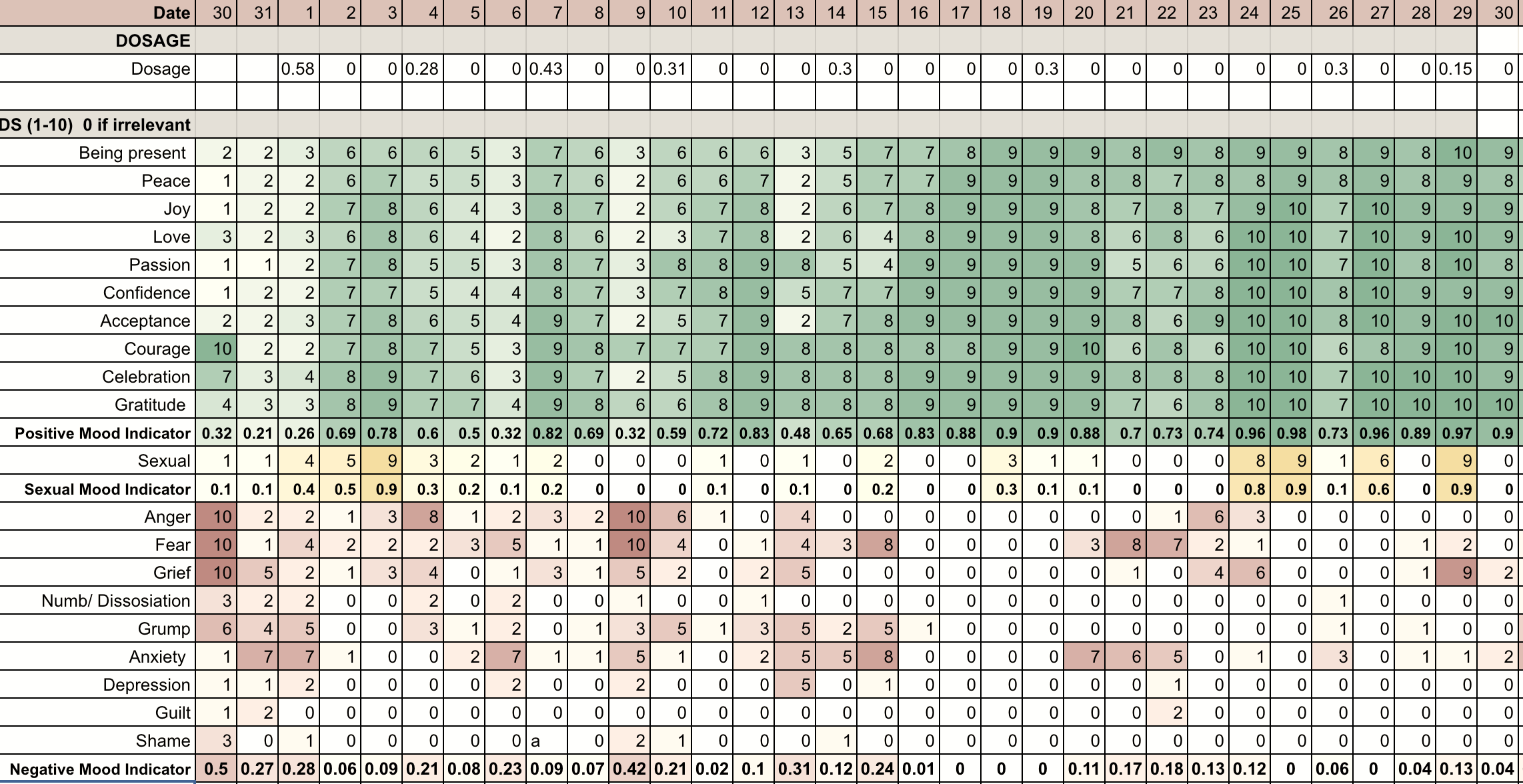
Another noticeable change was that thoughts and feelings became way less sticky - I had less rumination on the stories in my head, and could tap into the present more easily. For instance, instead of complaining in my head for hours about the tram being late and then my favorite dance class being canceled, I found myself quickly moving on and appreciating the beautiful trees and flowers on my way back home. The non-stickiness applies to the "positive" stories as well (like compliments or financial gain), which gave me a greater sense of equanimity.
In other words, microdosing on psilocybin wasn't stimulating my dopamine reward system and making me craving for pleasure; it wasn't numbing any emotional pain, either. Instead, it draws you closer to all feelings, and encourages you to be more curious about and spacious for them. And THAT, is the opposite to the mindset of addiction - to run away from pain.
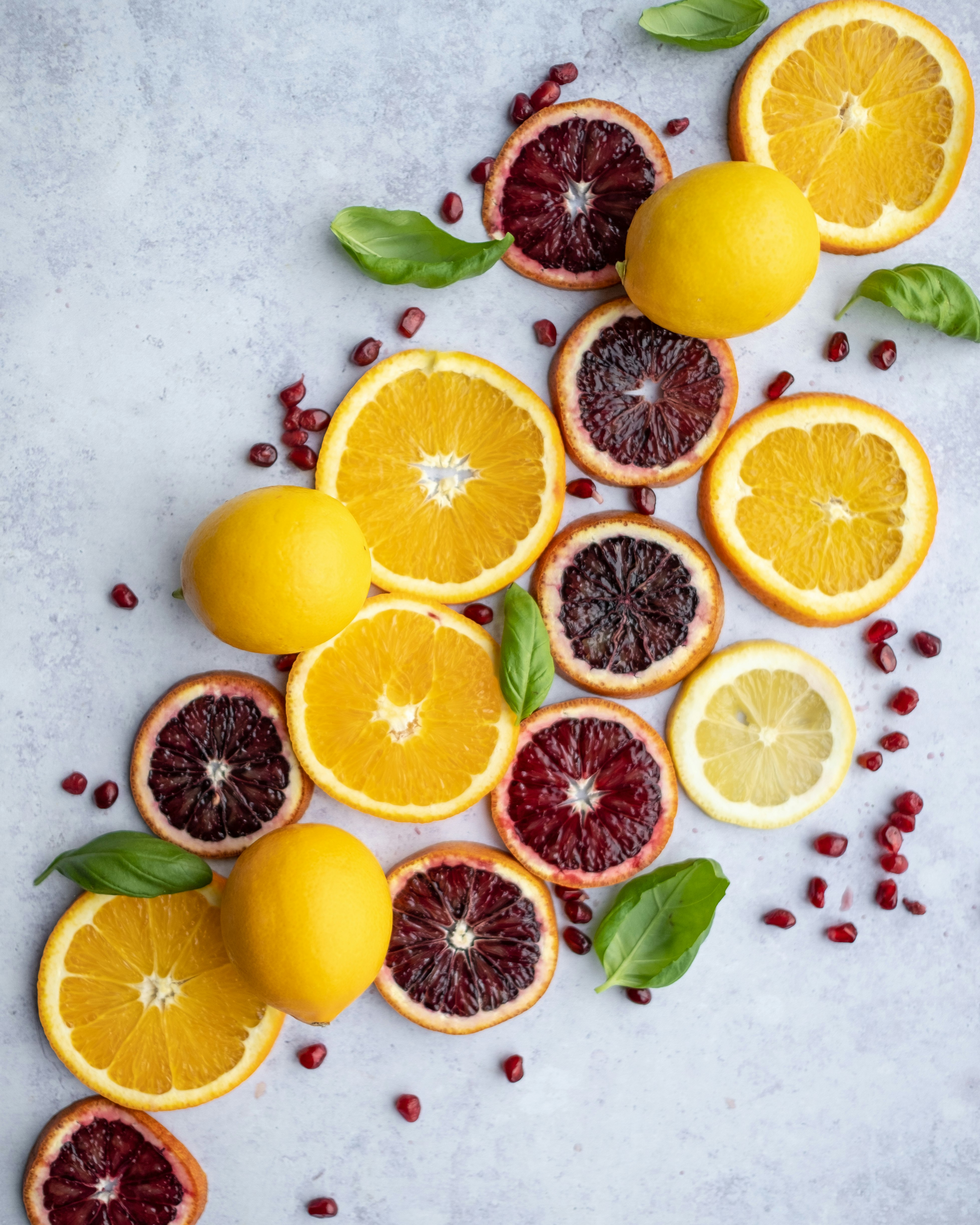
For those who are still interested in the "positive" and "negative", here are the specifics. In general, I felt more loving, passionate, celebratory and grateful for a larger part of the day. And even when I was fixing the kitchen sink or reporting taxes, which I used to hate, I could still feel a tint of joy and relaxation. The undertone of my overall emotional life has become much lighter and warmer, and that leads to a deep sense of confidence and optimism.
Anxiety, among other "negative" feelings, were easier to live with, too. Some researches have shown a rise in anxiety among quite some microdosing participants, but to me it doesn't feel like a "side effect". My guess is that the body does not yet familiar with the increased energy and sensitivity. A friend of mine, Dr. Alex Gearin, also comments, "after all, getting more in touch with the unconscious or 'feeling-body' is not always easy, but that's also where potent learning and transformation can reside, right?"
I also realized from my data that anxiety actually often co-existed with peace, joy, and connection on the same day. This has fundamentally changed my previous assumption that “anxiety ruins a whole day” into “I can still have a wonderful day while being anxious”. With this shift in perspective, I had much more space living with anxiety and would actively meet the needs behind it, which are usually connection, self-empathy and patience.
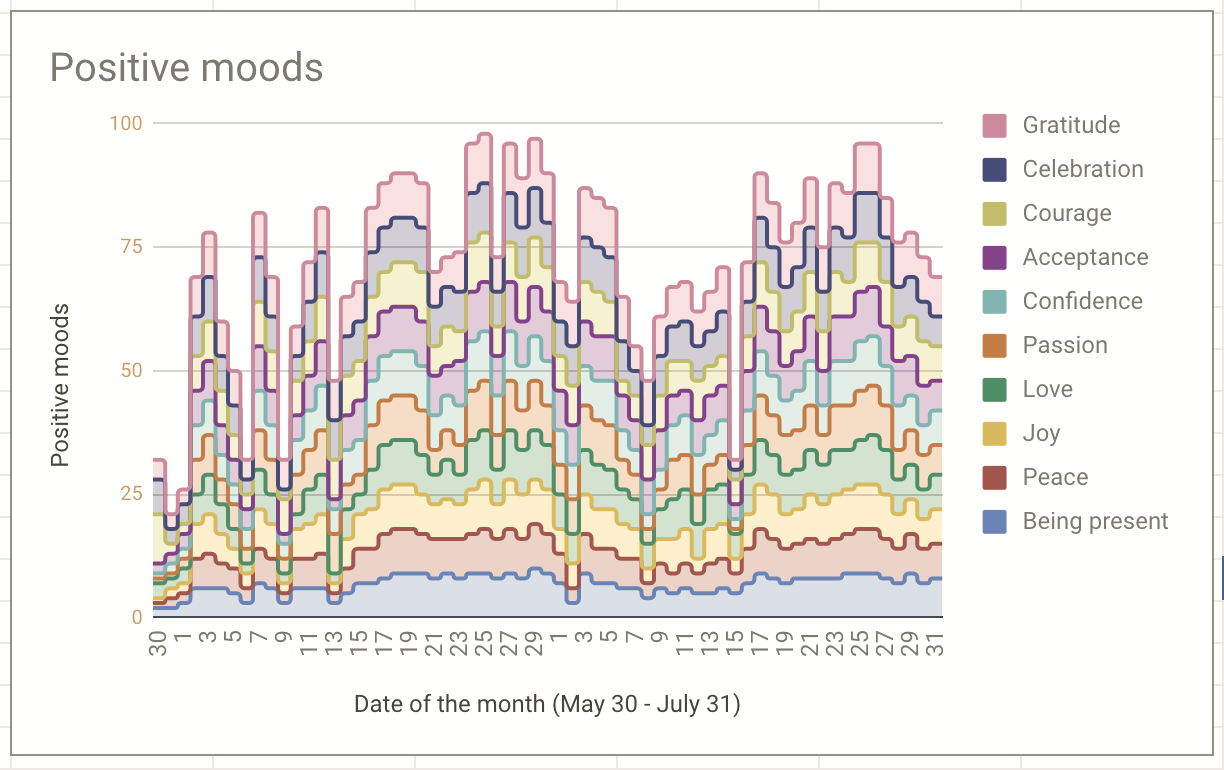
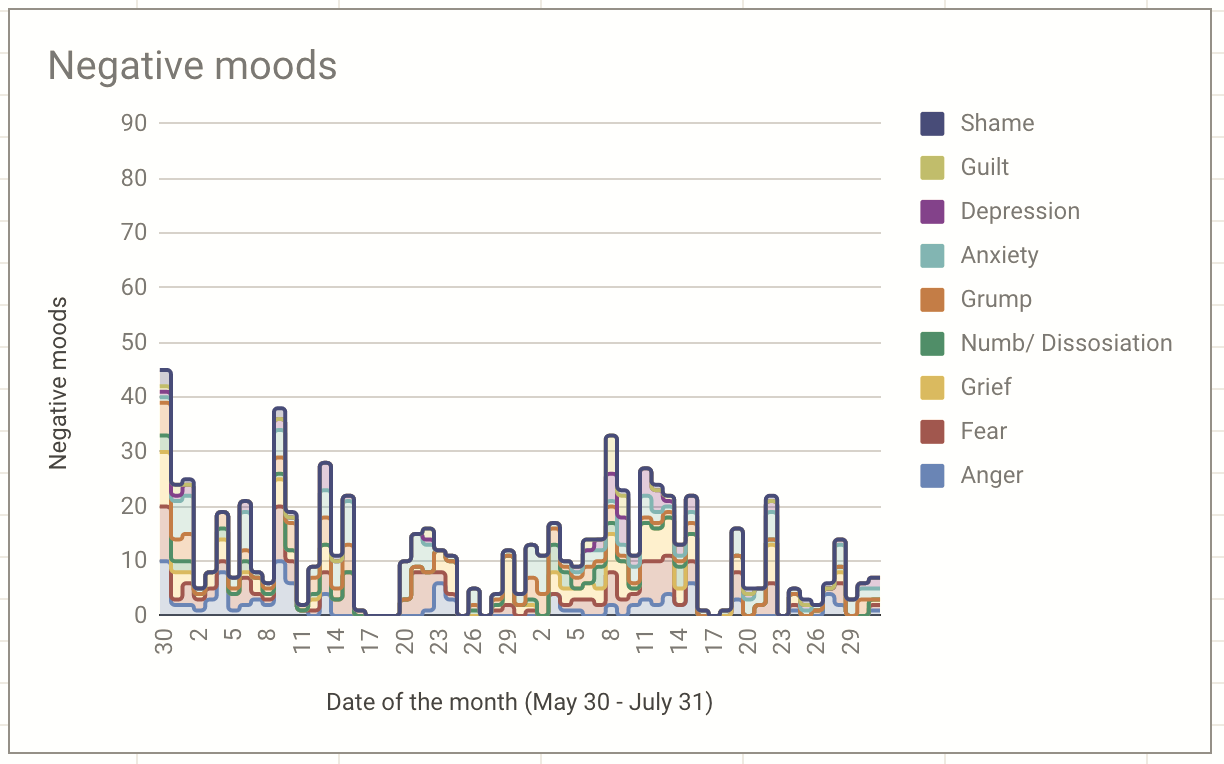
Indeed, there was a drop in the beginning of the no-dosing month, but I can't tell if it was only because of the withdrawal, or because I was going through some very challenging life events. Maybe both. And I believe this is where science should accommodate real life instead of the other way around: we can't have a controlled experiment where only the dosage changes and all other aspects of life remain, can we?
After 2 weeks of dropping and fluctuating, my positive feelings went back to the level of an average dosing day. And even the worst day after I stopped microdosing was not much worse than a not-so-great day during the microdosing. (Glad that I kept track, because otherwise my brain could easily catastrophize the drop and then make me panic or regretful.)
On a side note, interestingly, the very act of collecting these data has also become an emotional-awareness and self-care practice. Even now, four months after the microdosing, I still keep it as part of my evening ritual. When I go through the items on the sheet, I could take time to recall all my feelings and give them the attention they need. For example, if I move to "grief" and give it a 7, I would acknowledge how sad I was during the day, and then treat myself with more tenderness. Does a 7 in grief or 6 in anger make it a bad day? No, it's a rich day.
1.2. Productivity
Overall, my productivity increased compared to the previous months, measured by the amount of tomatoes I finished, my energy level, focus, inspiration, problem-solving as well as how much flow state I consider myself to be in. When the dosage was right, I could go and stay in the zone more effortlessly. I also noticed more bubbly inspirations coming up during brainstorm sessions, or I wrote more smoothly. Both my logical and visual thinking seemed to be enhanced. However, when I dosed higher than my sweet spot, I would get too hyper to focus. Over time, the more familiar I am to the feeling of flow state, the more easily I could access it, with or without microdosing.

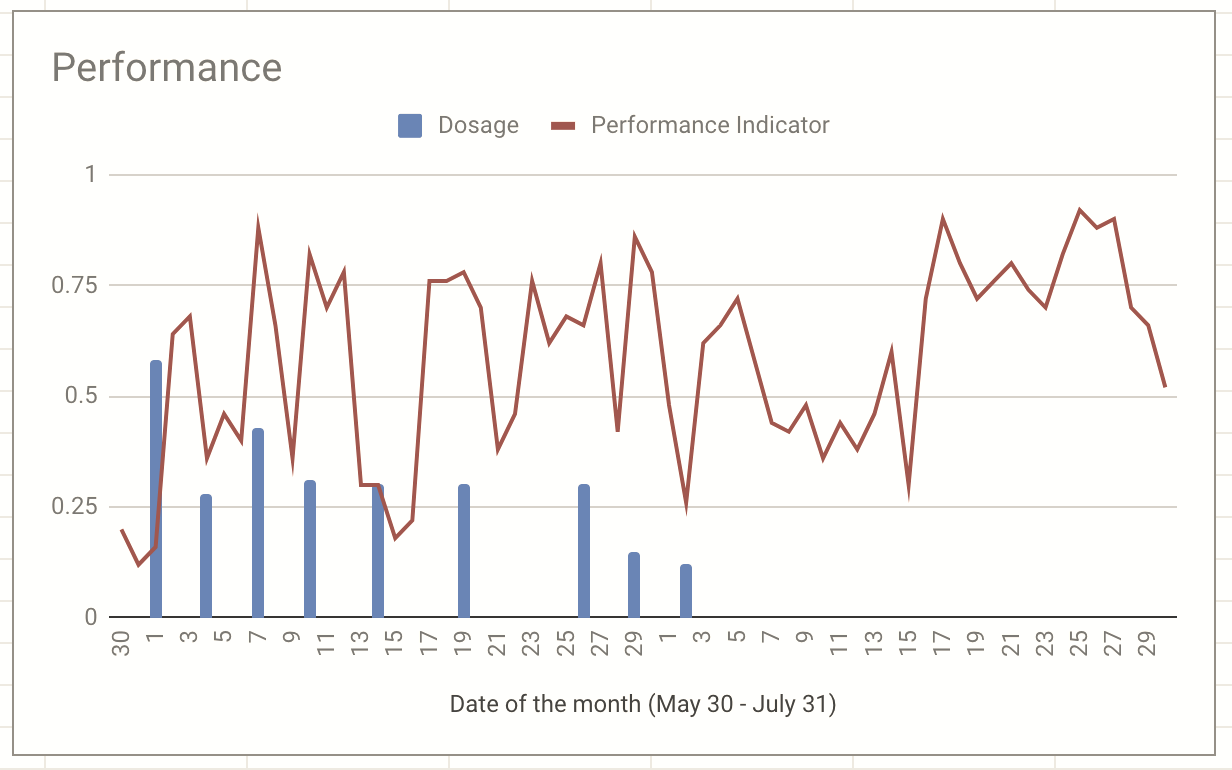
A great surprise for me is that my chronic fatigue was largely gone in those 30 days and after. As shown in the charts, the latter half of the no-dosing month actually went even more productive and stable than the dosing month. For the past decade, I’ve been constantly feeling tired, which, looking back, was less of a physical condition than a mental one - I wasn't living in my "zone of genius", and I was saying too many yeses to things I wanted to say no. Partly due to the energy boost from microdosing, and partly because I did more things I find meaningful and connected more with people I enjoyed being with, I became much more alive and less easily exhausted. A month of affirmation like this continues to reinforce the belief that "I can have lots of energy as long as I'm doing what I'm truly passionate about" till today.
Contrary to my skepticism, the enhanced productivity and gained energy didn’t turn me into a working machine. It simply made me create more quality content with less time, enjoy the meaningful work itself, and chill in the rest of the day. I find freedom and power this paradox: I can produce more now, yet I choose to do less.
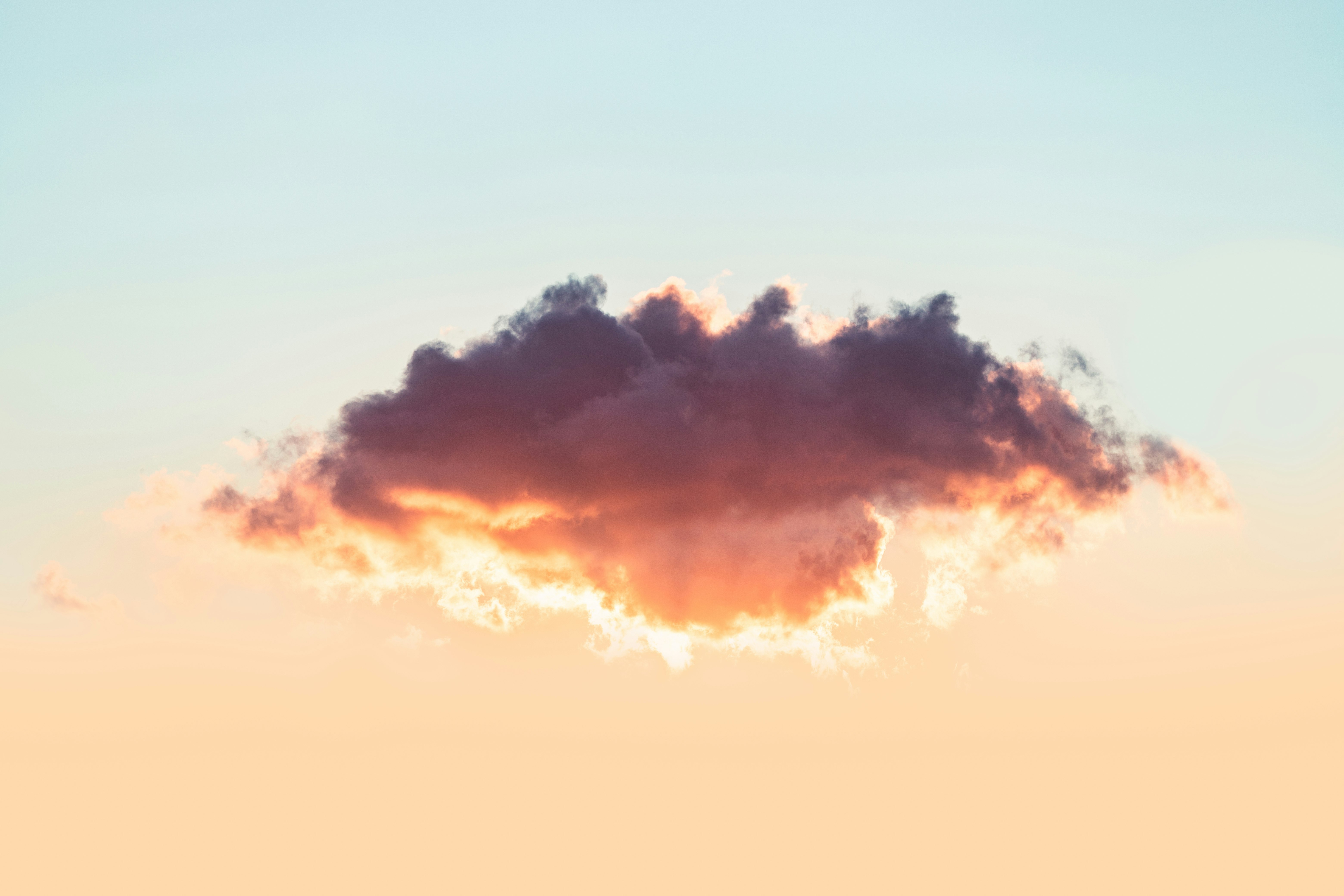
1.3. Connection
Microdosing on psilocybin truffles kept opening my heart and deepened my connection. I connected with myself much more closely - I would listen to my body, accept and investigate in my thoughts and feelings, and make decisions more and more in line with my needs. While I enjoyed the “me time”, I felt more connected with people, too. That month I hung out a lot with friends and hosted more dinner gatherings than usual; I also felt more devoted to the online community I’m leading.
My connection with nature started to skyrocket in the latter half of the month. No wonder people say microdosing on truffles can be described as "earthy", while on LSD as "crispy". I found myself spending much more time simply wondering at a flower or a leaf, watching sunset or biking slowly in the forest.
Interestingly, unlike high-dose journeys, during microdosing I didn’t think much about the mystery of life, death, cosmos or spirits as I would before and after that month. Again, I owe that to the earthy, grounding nature of truffles, which made me feel quite content with my day-to-day life. Of course, I was still connected to spirituality in its broader sense, which is simply, being in the now.
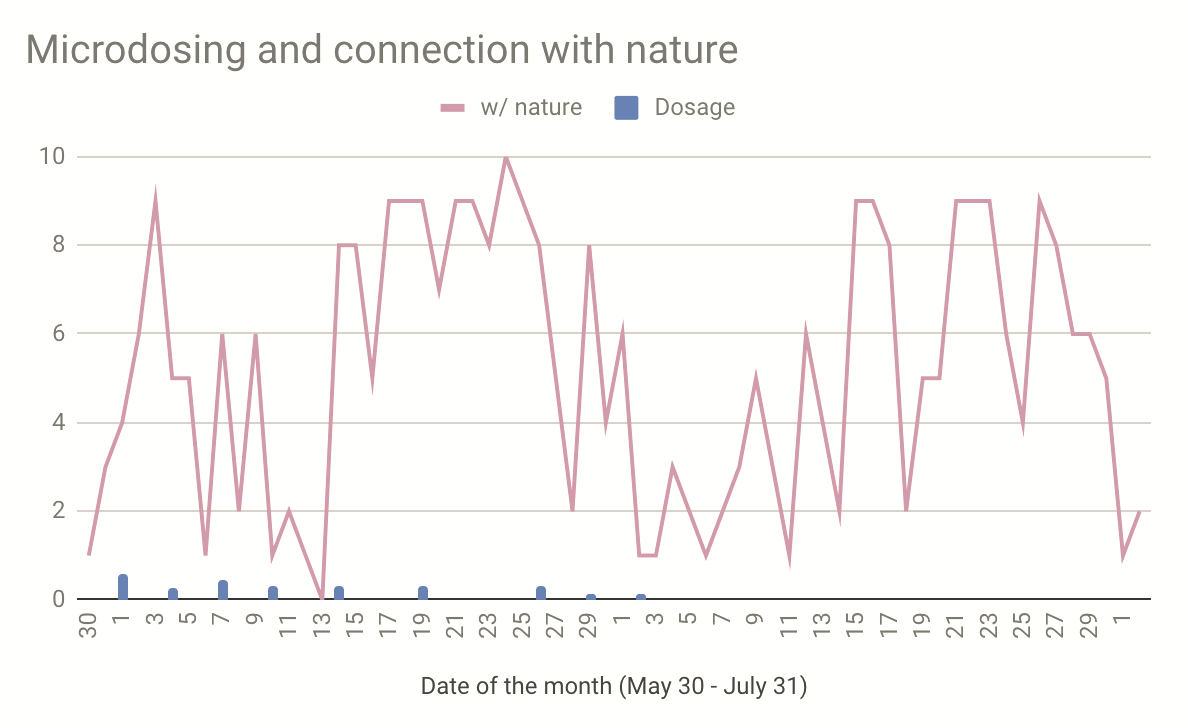
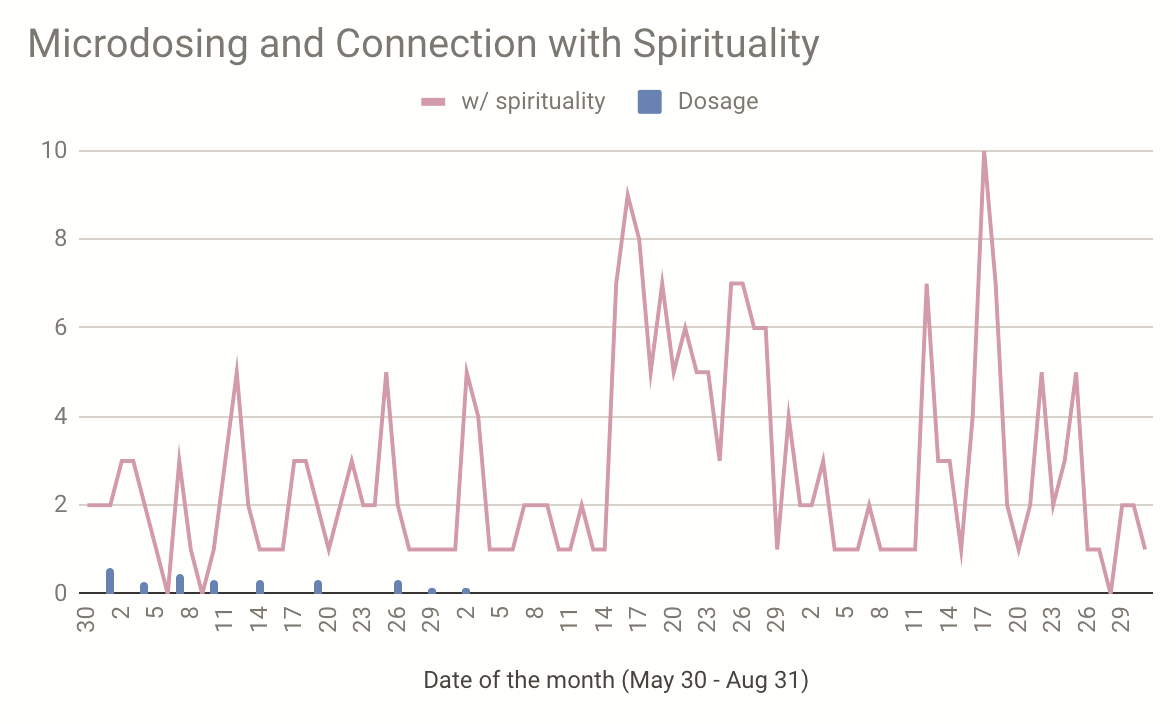
1.4. Habits
I intended to use microdosing as a propeller for better habits so as to integrate the learning from both big and micro psychedelic journeys. Well, I was already having quite some good habits before that month, such as meditating, doing yoga, working out, eating healthily, getting things done. But microdosing helped me to anchor them even deeper, making them an almost auto-running system, so that I could use less and less willpower to do these things.
Sometimes I doubt if these habits actually play a much larger role for a good day than the drugs. If so, is microdosing nothing but a placebo? Maybe yes, but hey, if a placebo makes me more willing to do what’s good for me, I don’t really mind. I like how Fadiman & Korb defines it: Placebo is a "natural healing response of the body". In that sense, with microdosing/ placebo as a catalyst, my body might have been just fine-tuning itself towards its own healing and thriving.
2. Downsides
Now, some honest talk about the side effects and withdrawal symptoms.
As I said earlier, the sweet spot varies from person to person. I started with a much higher dose than I actually needed, so I ended up being irritable, feeling upset in my stomach, being panicked at night, having sour sweat (quite similar to the smell of teh truffles), and feeling hungry all the time. Energy-wise, I'd be hyper in the day yet exhausted at 8pm already. When the dosage was right, however, all those side effects were gone.
When I withdrew from the 30-day microdosing, I experienced a lot of heavy-headedness and occasional migraines. In the first two weeks, I woke up feeling soggy, and didn’t have enough energy or willingness to keep up the good habits. Thoughts became sticker than last month, followed by my frustration for not being able to keep the effects. As mentioned earlier, I can’t say for sure to what extent the drop came from the withdrawal or from the challenges in life. Would the withdrawal be smoother for others? Would it be a good idea to taper off? I'd love to see more research on it.
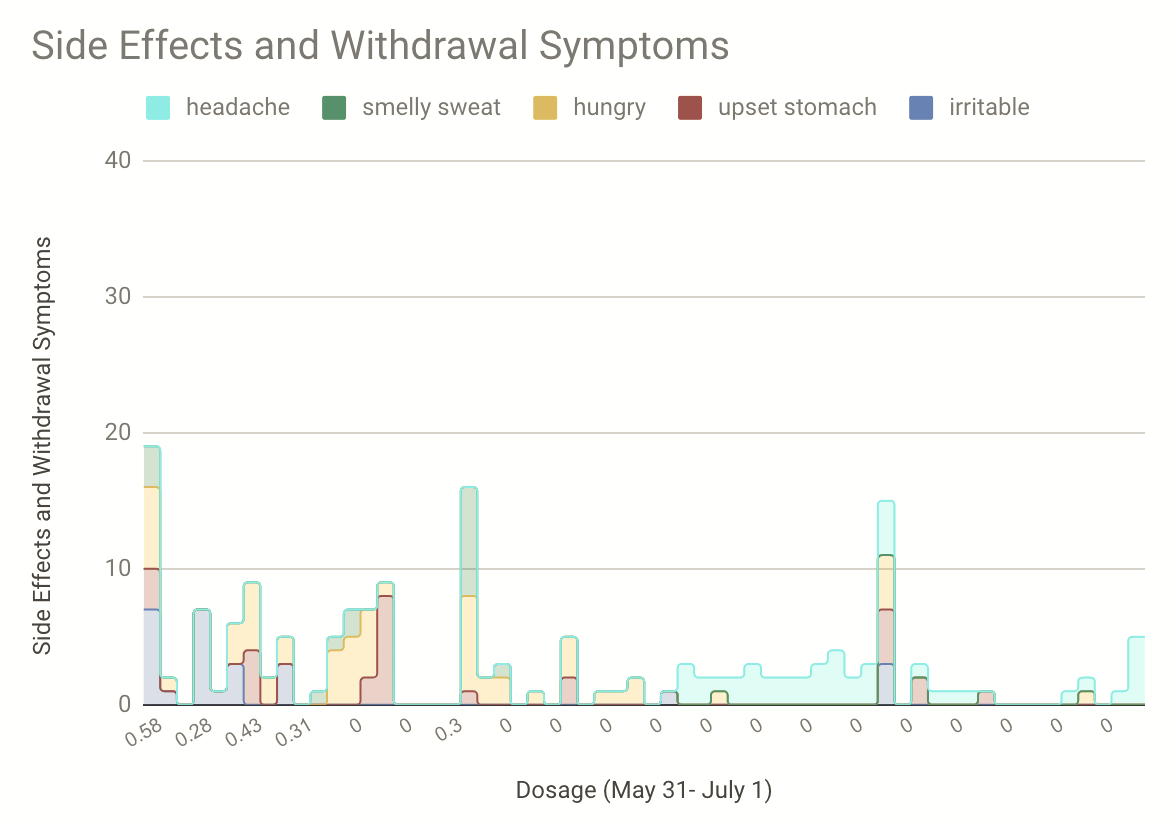
4 months have passed from the experiment, I feel as good, if not better, and I don't miss microdosing at all. One day I tried to microdose a bit of truffle and another day LSD to boost my productivity, and I found that they didn't make a huge difference compared to a good enough day nowadays. Actually, as my body gets more sensitive after the withdrawal, the same sweet-spot dose drove me more restless, instead of bringing me concentration and inspiration.
That's another reason why it's not hard to let go of the assistance of psychedelics - microdosing is like riding a bike with training wheels; now that you can ride without your hands even, why do you want to go back to the wheels unless it's for some childlike fun?
3. Long-term Benefits
Even now, I can still feel the afterglow of this 30-day experiment. One of the most long-lasting effects is that I have some embodied (and charted) memories of my own version of "a really good day". And better yet, I realized there’s nothing magic about such a day - it's like a fresh apple hanging low on a tree, and I only need to be more attentive and raise my hand a bit higher. Such efforts can be pleasantly made without using psychedelics daily.
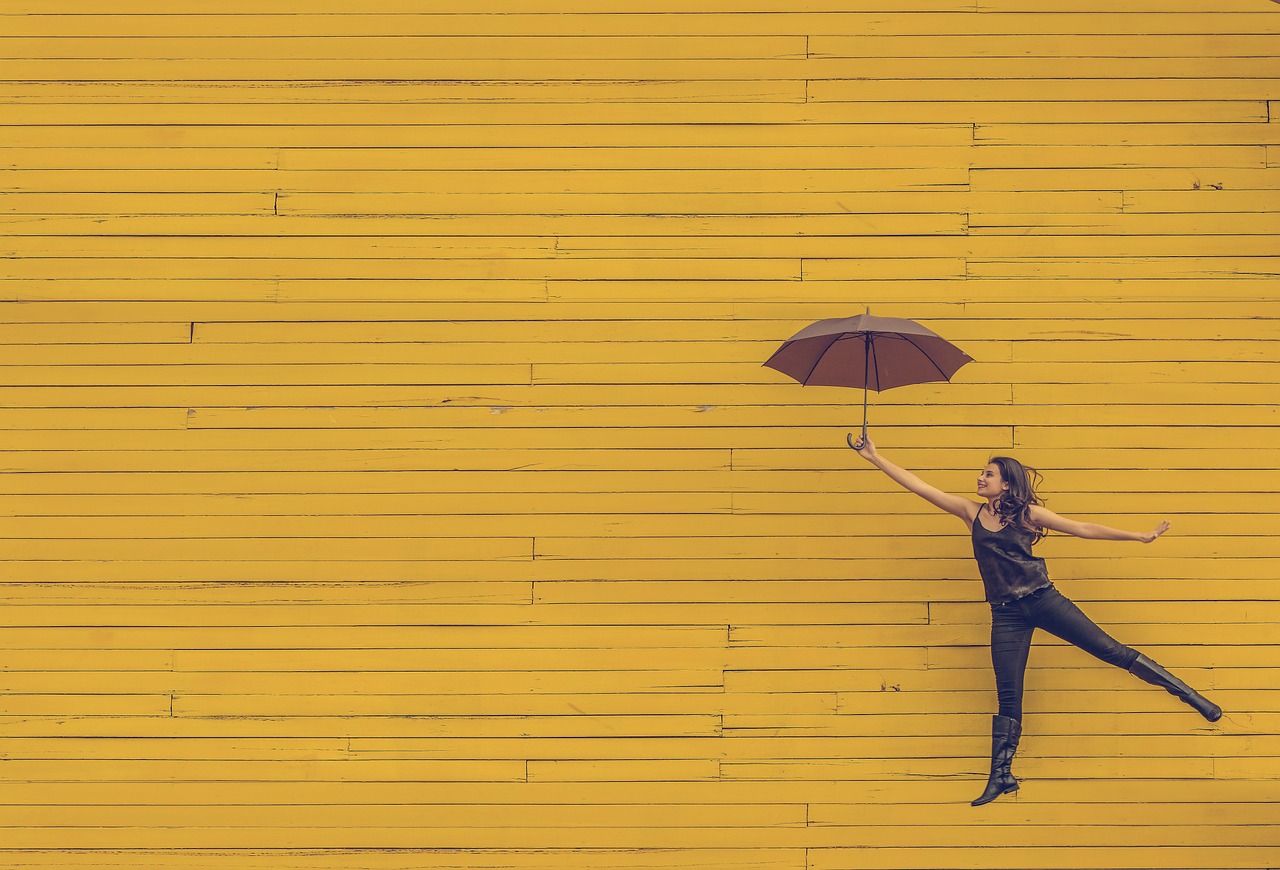
Here are some features of my really good day:
- Peace and joy is in the background, no matter how stormy it occasionally seems.
- Thoughts and feelings are not sticky, so I can have more time being centered and present.
- The day starts with my morning rituals - meditation, stretches, journaling, healthy breakfast, before I turn on my phone.
- I connect with people from my heart, and say no to things I don’t have a passionate yes to.
- When I work, I can tap into the flow state, and I choose to work less despite my improved productivity.
- I no longer find everyday chores boring; I do it with presence and joy.
- I appreciate the beauty in nature, in the urban environment I live in and in many other details that I would otherwise ignore.
- My heart feels both soft and strong: soft as in self-love and compassion, strong as in confidence and resilience.
- I finish my day with my gratitude journal, and have a good night's sleep.
I’m not saying that microdosing has made me happily ever after. I still have terrible days, and that's okay. My previous concern was debunked: having experienced a really good day does NOT make a bad day intolerable. Instead, knowing that the good and bad all come and go, I became more at ease in front of challenges. Maybe that’s what they call neuroplasticity?
Another long-term effect is about my diet. After transitioning for half a year, I went fully vegan right before I started microdosing, and I was gladly surprised that microdosing is such a great companion for new vegans. It makes a vegan lifestyle much easier and more joyful to maintain - since with truffles one seems to be more connected to nature and drawn to fresh healthy plant-based food anyway, going vegan seems just a small step to take on top of that.
4. Methodological Limitation
There are several limits of this self-experiment:
- It wasn’t an ABA design. I didn’t track the month before, so we could not see the changes microdosing brings about compared to the previous months.
- Because of some physical discomfort in the middle of the month, I didn’t follow strictly the rhythm of dosing every third day. In the last ⅓ of the month, I felt good enough, so I didn’t feel the need to dose. Such irregularities made it difficult to see the effects of single dosing days in comparison with no-dosing days.
- The variables in my life other than dosage are hard to control, and that’s why rigorous studies with a larger sample are more helpful in flattening the impact of other factors in an individual’s life.
- The scoring of each item is quite intuitive, thus random. I didn’t have a list of fixed definitions and criteria. I notice that with time I became way more lenient when I gave a 9 or 10 to, for instance, “love”.
However, I doubt if the last one is simply methodological sloppiness. As microdosing softened my inner critic, I no longer held the same unrelenting standards when I think of “love”, “joy”, “inspiration”, and “flow state”. Previously, only working my ass off for 3 hours and producing a super satisfactory article deserved a 7 in the flow state, but now I would generously give the same to an hour of highly focused, relaxed and pleasant house cleaning.
This last “limitation”, if seen from a larger perspective than empirical research, is not necessarily a drawback. Microdosing changed the way I relate to myself and to the world, to the extent that day by day the “I” filling in the data is no longer the same person months ago. The feeling of deep content replaced the harsh voices, so that the previous “so-so” things became something I celebrate with a 9 or 10 at the end of the day.
To me, such growing compassion towards myself is just as meaningful as creating perfectly scientific data. It invites us perfectionists to make a choice: to beat yourself up for not achieving the improbable 10, or to change the definition of 10?
Am I going to try microdosing again? Maybe; maybe not. But I’ll be good enough either way.
-The end-
The Chinese version of this report is here. 点此查看文章中文版
Thanks to my friend Dr. Greg Siegel's inputs on the data analysis, and Derk Geene's help with data visualization.
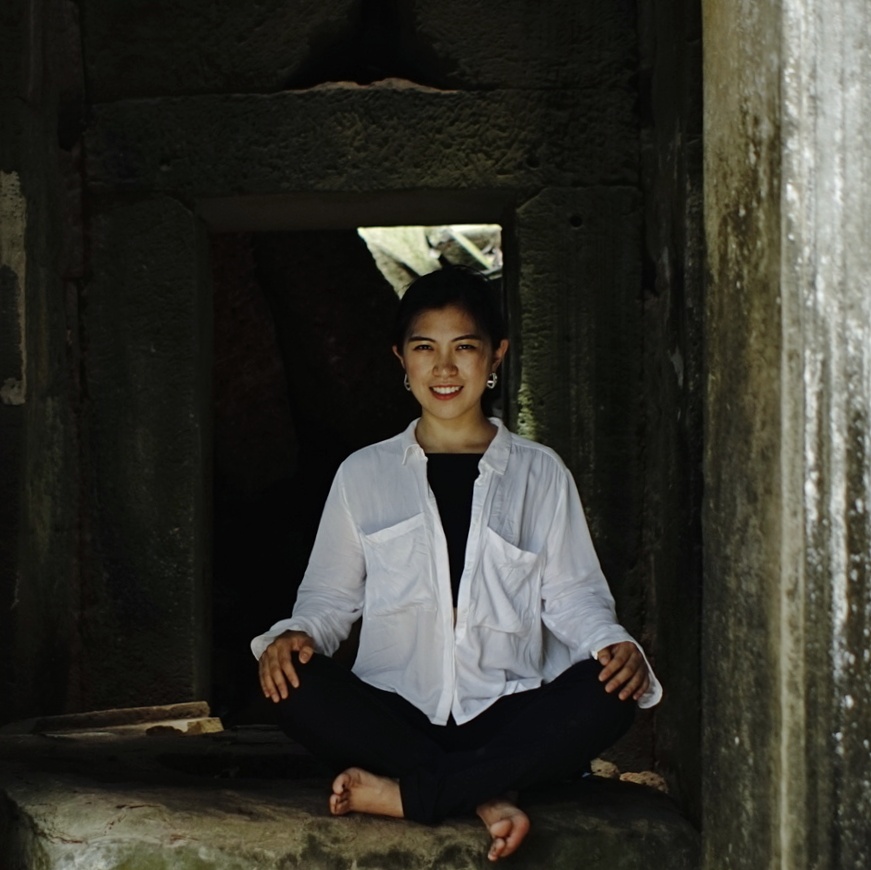
About the author
Dr. Jingshu Zhu, having finished her PhD in Law and Anthropology, she found her “zone of genius” in catalyzing authentic connection and fun growth.
Currently she works as a transformational coach. Circling, meditation, non-violent communication, sacred sexuality and intentional use of psychedelics are her major fields of passion.
She has translated Covering (Kenji Yoshino), Waking Up (Sam Harris) and How to Change your Mind (Michael Pollan) into Chinese.
Interested in a guided psychedelic session? Book a free 45-minute intake session with me.